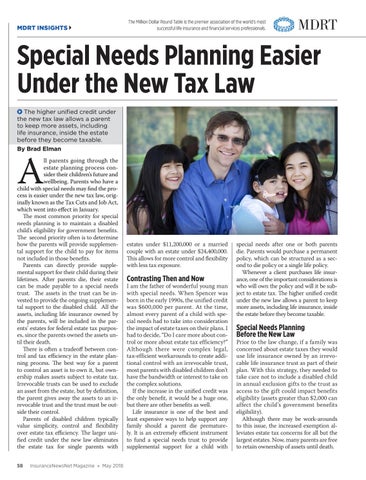MDRT INSIGHTS
The Million Dollar Round Table is the premier association of the world’s most successful life insurance and financial services professionals.
Special Needs Planning Easier Under the New Tax Law The higher unified credit under the new tax law allows a parent to keep more assets, including life insurance, inside the estate before they become taxable. By Brad Elman
A
ll parents going through the estate planning process consider their children’s future and wellbeing. Parents who have a child with special needs may find the process is easier under the new tax law, originally known as the Tax Cuts and Job Act, which went into effect in January. The most common priority for special needs planning is to maintain a disabled child’s eligibility for government benefits. The second priority often is to determine how the parents will provide supplemental support for the child to pay for items not included in those benefits. Parents can directly provide supplemental support for their child during their lifetimes. After parents die, their estate can be made payable to a special needs trust. The assets in the trust can be invested to provide the ongoing supplemental support to the disabled child. All the assets, including life insurance owned by the parents, will be included in the parents’ estates for federal estate tax purposes, since the parents owned the assets until their death. There is often a tradeoff between control and tax efficiency in the estate planning process. The best way for a parent to control an asset is to own it, but ownership makes assets subject to estate tax. Irrevocable trusts can be used to exclude an asset from the estate, but by definition, the parent gives away the assets to an irrevocable trust and the trust must be outside their control. Parents of disabled children typically value simplicity, control and flexibility over estate tax efficiency. The larger unified credit under the new law eliminates the estate tax for single parents with 58
InsuranceNewsNet Magazine » May 2018
estates under $11,200,000 or a married couple with an estate under $24,400,000. This allows for more control and flexibility with less tax exposure.
Contrasting Then and Now
I am the father of wonderful young man with special needs. When Spencer was born in the early 1990s, the unified credit was $600,000 per parent. At the time, almost every parent of a child with special needs had to take into consideration the impact of estate taxes on their plans. I had to decide, “Do I care more about control or more about estate tax efficiency?” Although there were complex legal, tax-efficient workarounds to create additional control with an irrevocable trust, most parents with disabled children don’t have the bandwidth or interest to take on the complex solutions. If the increase in the unified credit was the only benefit, it would be a huge one, but there are other benefits as well. Life insurance is one of the best and least expensive ways to help support any family should a parent die prematurely. It is an extremely efficient instrument to fund a special needs trust to provide supplemental support for a child with
special needs after one or both parents die. Parents would purchase a permanent policy, which can be structured as a second to die policy or a single life policy. Whenever a client purchases life insurance, one of the important considerations is who will own the policy and will it be subject to estate tax. The higher unified credit under the new law allows a parent to keep more assets, including life insurance, inside the estate before they become taxable.
Special Needs Planning Before the New Law
Prior to the law change, if a family was concerned about estate taxes they would use life insurance owned by an irrevocable life insurance trust as part of their plan. With this strategy, they needed to take care not to include a disabled child in annual exclusion gifts to the trust as access to the gift could impact benefits eligibility (assets greater than $2,000 can affect the child’s government benefits eligibility). Although there may be work-arounds to this issue, the increased exemption alleviates estate tax concerns for all but the largest estates. Now, many parents are free to retain ownership of assets until death.
